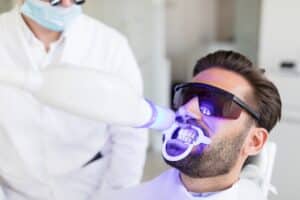Festive delicacies, family get-togethers, and happiness are all part of the holidays. However, nothing can destroy the festive mood more than dental discomfort, as everyone who has ever had a toothache over the Christmas season knows.
Whether it’s the additional sugar from Christmas sweets, candy canes, or nuts, a sudden toothache can strike without warning and cause agony. But don’t worry! A few easy techniques can help you handle a dental emergency and maintain a cheerful and joyous Christmas.
This tutorial will explain how to treat a toothache that may occur over the holiday season so that you may continue to enjoy the celebrations.
Why Do Toothaches Strike During The Holidays?
The holidays are filled with indulgence—rich foods, sugary treats, and a few extra cups of holiday punch. But while these indulgences are a fun part of the season, they can also contribute to tooth problems. Here are a few reasons why toothaches might appear during the holidays:
- Excess Sugar: Sweets like cookies, pies, and chocolates feed the bacteria in your mouth, which can lead to cavities and tooth decay.
- Cold Weather: Cold air can exacerbate tooth sensitivity, especially if you already have weakened enamel or a cavity.
- Chewy and Hard Foods: Some holiday foods are hard to bite into or chewy, which can put pressure on your teeth and cause pain if you have a crack, filling, or untreated cavity.
What To Do When The Pain Attacks Your Teeth?
No matter the cause, the result is the same: a toothache that can put a damper on your holiday spirit. So, what can you do when that pain strikes?
Step 1: Don’t Panic—Identify The Problem
The first step in handling a dental emergency is to stay calm. Toothaches can feel intense, but understanding what’s going on can help guide your next steps.
- Sharp, Sudden Pain: This may indicate a cavity or a cracked tooth.
- Dull, Constant Ache: This could be a sign of gum infection or an issue with a dental filling.
- Pain When Biting Down: If chewing or biting down causes pain, there may be a problem with a tooth or filling.
Once you’ve identified the pain type, you can take the right steps to manage it.
Step 2: Take Immediate Pain Relief Action
While you’re waiting for our dentist appointment (or if it’s after hours and you need some temporary relief), there are a few things you can do to ease the discomfort:
Over-the-Counter Pain Relievers
- Ibuprofen (Advil) and Acetaminophen (Tylenol) can help alleviate the pain temporarily. Just be sure to follow the dosage instructions.
Cold Compress
- Apply a cold compress to your cheek near the painful tooth. The cold can help reduce swelling and numb the area. Do this for about 15 minutes, then take a break.
Salt Water Rinse
- A saltwater rinse can help clean the area around the painful tooth, reducing inflammation and soothing the gums. Mix a teaspoon of salt in warm water and swish it around your mouth.
Topical Anesthetics
- Over-the-counter gels (like Orajel) can provide temporary relief. Apply the gel directly to the painful tooth or gums.
Avoid Trigger Foods
- Stay away from extremely hot, cold, or sweet foods and drinks that can worsen your toothache.
Step 3: Call Our Dentist for Help
Even if the pain is temporarily relieved, it’s crucial to get professional help as soon as possible. We offer emergency services, especially during the holiday season. Here’s what to do next:
- Call Our Dentist: Explain your symptoms and see if you can be seen right away or scheduled for an appointment.
- Visit an Urgent Care Clinic: If the pain gets unbearable and you can’t wait, consider visiting our dental clinic for immediate care.
Our dentist will be able to diagnose the underlying cause of the toothache and recommend the proper treatment. It could involve anything from a simple filling or cleaning to more involved treatments like root canal therapy.
Step 4: Manage Sensitivity and Discomfort Until Your Appointment
In the meantime, there are a few things you can do to minimize discomfort:
- Use a Soft-Bristled Toothbrush: While brushing, switch to a soft-bristled toothbrush to avoid irritating the affected area.
- Avoid Chewing on the Side of the Pain: Chewing can aggravate the pain. Stick to soft foods and chew on the opposite side of your mouth until you can get professional help.
- Elevate Your Head: If the pain worsens at night, try propping up your head with extra pillows. Lying down can sometimes make the pain feel more intense.
Step 5: Prevent Future Toothaches
Once your toothache is resolved, it’s time to focus on prevention. After all, you want to enjoy every holiday season without worrying about dental emergencies. Here are some tips to keep your smile healthy year-round:
- Maintain Good Oral Hygiene: Brush twice a day, floss daily, and use mouthwash to keep your teeth and gums healthy.
- Regular Dental Checkups: Schedule checkups every six months to catch issues early before they become emergencies.
- Avoid Excessive Sugar: While it’s tempting to indulge in holiday sweets, remember to brush your teeth after consuming sugary treats to prevent cavities.
- Wear a Mouthguard: If you grind your teeth at night, consider using a mouthguard to prevent wear and tear.
Keep Your Holiday Spirit Bright Like Your Smile!
A toothache can feel like the ultimate party pooper, but by following these simple steps, you can get the relief you need and continue enjoying the holiday season. Don’t let a dental emergency stop you from savoring every moment of Christmas—whether it’s indulging in your favorite treats, laughing with family, or simply relaxing by the fire.
If you experience a toothache this Christmas, remember to stay calm, manage the pain, and get professional help. With a little care and attention, your smile will be merry and bright for the rest of the holiday season!
Happy Holidays, here’s to a pain-free Christmas!





